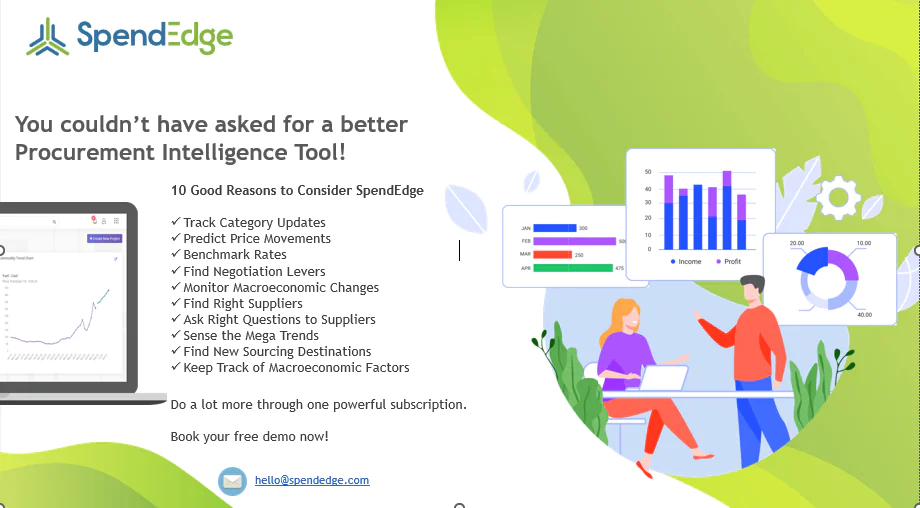Author: Vice President, Marketing Strategy, SpendEdge
Every industry has transformed exponentially over recent decades because of rapid technological advancement, higher consumer awareness, increasing interaction and communication, and the rising use of digital platforms. This has led to a dire need for robust systems, streamlined supply chains, well-trained employees, and strategic procurement. Nevertheless, the increasing complexity and evolution in the pharmaceutical industry necessitates strategic procurement to address procurement challenges, reduce costs, and enhance overall efficiency. Given the prevalence of chronic diseases and the demand for innovation, strategic procurement becomes crucial for sustainable growth in the dynamic nature of the pharmaceutical industry.
Key Pharma Procurement Challenges
Lack of Supply Chain Transparency
Poor Supplier Performance
Unexpected Geographical Factors
Lack of Supply Chain Transparency
The lack of supply chain visibility makes it challenging for pharma companies to plan production, forecast demand, and manage inventory effectively. With consistent and standardized data, law regulators, policymakers, and healthcare providers (HCPs) can make informed decisions to improve supply chain resilience.
Poor Supplier Performance
Poor supplier performance results in unanticipated expenses and disruptions in the procurement cycle. For example, a pharmaceutical brand can face increased acquisition costs if a supplier fails to deliver on time. These performance issues can create severe disruptions at any level of the supply chain, impacting drug availability.
Unexpected Geographic Factors
Many pharmaceutical companies rely on global markets for drug materials and are particularly vulnerable to shifting geopolitical situations. For instance, depending on sources in tariff-affected countries can substantially increase a pharma company’s operational expenses, complicating the comprehensive procurement process.
Request a proposal for our strategic procurement solutions to strengthen your supplier base
Key Pharmaceutical Procurement Methods
Direct procurement:
Materials or medications are purchased at the quoted list price or a negotiated discount from a single supplier.
Competitive negotiation:
To get a better deal or secure specific service terms, the buyer approaches a small group of suppliers—typically at least three.
Open tender:
Any supplier representative may make an offer subject to the terms and restrictions specified in the tender invitation.
Restricted tender:
Suppliers must undergo the prequalification process to demonstrate their prior supplier performance, manufacturing methods, and financial stability.
Shopping locally or abroad:
Similar to competitive negotiation, the business typically contacts at least three suppliers, locally or abroad, for pricing discussions.
Key Benefits of Strategic Procurement in the Pharmaceutical Sector
Cost-Reduction:
As demand rises, pharma companies need to increase their focus on strategic procurement to reduce costs. By leveraging strategic procurement, companies can develop more precise and dependable procurement strategies and strong business partnerships, leading to significantly reduced costs and a more robust supply chain.
Improved Partnerships:
Strategic procurement can result in a well-developed partnership that can provide companies with quicker resources, new perspectives, insight into changing trends, and robust strategies that utilize the combined knowledge of both parties.
Higher Efficiency:
The strategic procurement process addresses inefficiencies, targets shortcomings, and develops sustainable alternative solutions to ensure improved functioning. Implementing robust strategies and data-driven systems can enable long-term growth and success.
Risk Management:
As the pharma industry expands, the value chain becomes increasingly complex and prone to various challenges. Therefore, risk management becomes crucial to achieving a resilient supply chain. Failing makes it difficult for companies to address potential risks efficiently, leading to significant losses, customer attrition, and reduced market share.
Better Decision-Making:
Strategic procurement is a highly data and information-reliant process that encourages businesses and stakeholders to understand their market, company, and needs comprehensively. As the pharma industry grows, making the right decisions can propel companies to leadership.
Success Story
A renowned pharmaceutical manufacturer struggled to keep pace with the sudden transformation in the industry caused by the COVID-19 pandemic and suffered significant monetary and market share losses, causing it to lose its reputation and customers. Inefficiencies, strained supplier relationships, and unnecessary rising costs led to a weak supply chain and an inability to adapt as the market changed. Therefore, the company sought to improve its procurement processes and overall performance by seeking our expertise in strategic procurement.
Our experts at SpendEdge guided the company with detailed insights into the necessary changes required and crucial best practices of strategic procurement. Strategic procurement helps comprehensively understand a company’s needs, expectations, and requirements. Subsequently, this awareness guided them to develop partnerships based on transparency and clear objectives, giving rise to sustainable, reliable, and long-term partnerships that are crucial in the challenging pharma industry.
By implementing the data and processes provided by our experts, the manufacturer successfully addressed its challenges and shortcomings, implemented necessary changes, and ultimately reestablished itself as an industry leader. The insights provided the company with essential data and information regarding its operations to help tackle obstacles, identify risks, and mitigate challenges, which improved efficiency in the long run.
Get on a call with our experts for more information on strategic procurement in pharma

Conclusion
In conclusion, strategic procurement in the pharmaceutical industry is significant in navigating the complex landscape of drug selections, drug quantities, and procurement methods. By leveraging pharmaceutical expertise, companies can address challenges such as procurement disruptions and hidden expenses in an ethical way. Through strategic partnerships with suppliers and distributors, pharmaceutical enterprises can ensure favorable purchase prices and mitigate risks associated with improper packaging or regulatory compliance. Implementing efficient procurement cycles and utilizing e-procurement platforms are essential for effectively managing the pharmaceutical logistic cycle, especially in sourcing large molecule biologics. Despite the myriad challenges, embracing strategic procurement practices empowers companies to optimize their supply chains and maintain a competitive edge in the ever-evolving pharmaceutical market.




